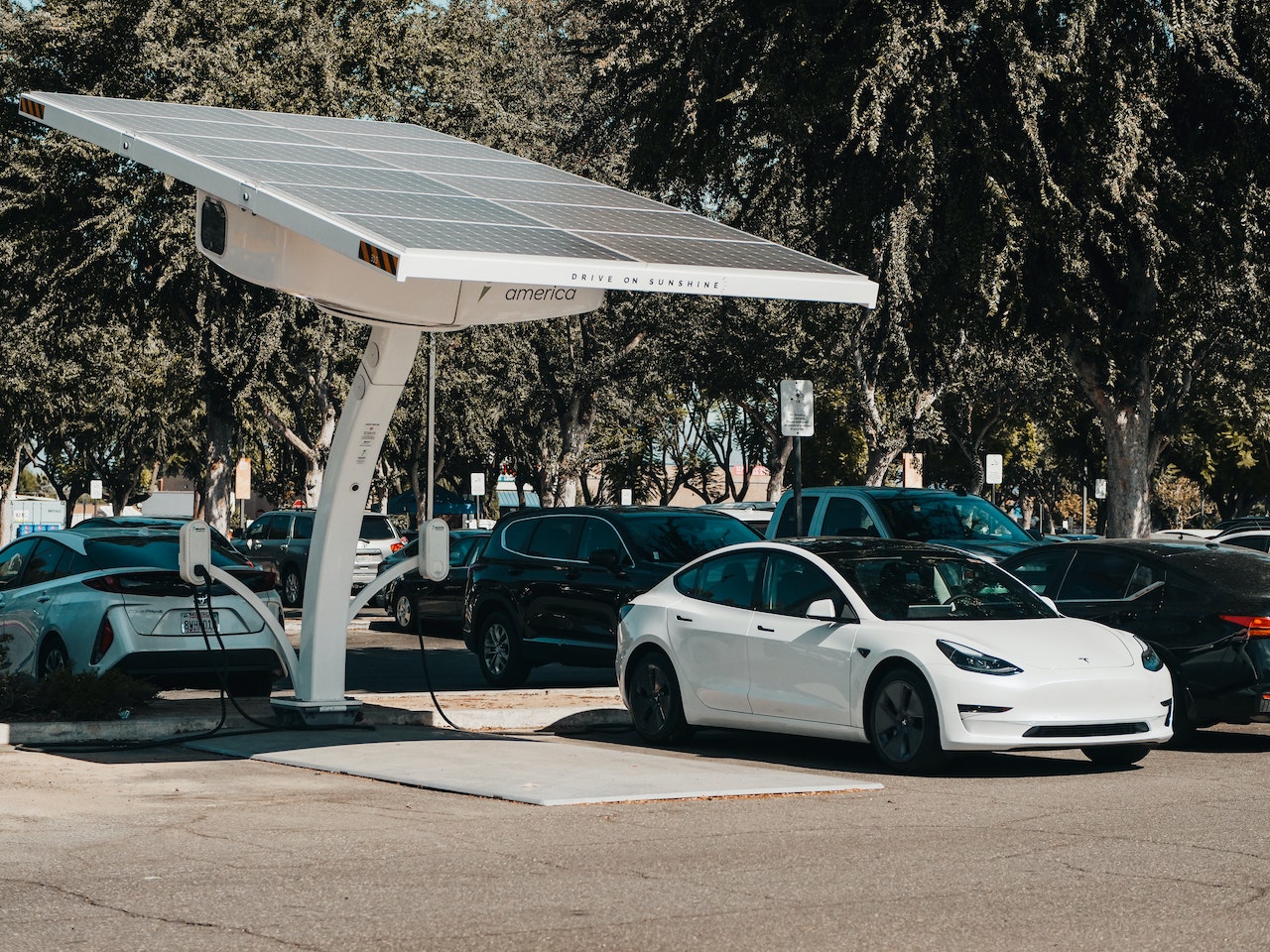Can You Charge an Electric Car with Solar Panels?
Many EV drivers opt for an eco-friendly vehicle to support sustainable living aspirations – and the good news is that you can charge an EV with solar panels, provided you have the right converter and charging unit installed at your home.
To find out how much an electric car charge point will cost, fill out the form below and we'll connect you with reputable EV charger installers in your area - for free! Compare no-obligation quotes:
EVs produce zero emissions as a cleaner, greener transport solution. One EV replacing a fuelled vehicle can reduce CO2 emissions on UK roads by over a million and a half CO2 grams, as an increasingly popular option ahead of the 2030 ban on sales of new petrol or diesel cars.
With 25% of households considering an EV over the next five years, research by the energy regulator Ofgem indicates that 36% are concerned about the lack of local charging facilities – making a home charging unit a good option.
Compare EV Charger Costs
Compare installer costs in your area today and save £££
Options for Charging an EV at Home
There are three possible ways to charge an EV at your property:
- Using a standard three-pin plug. This option is not recommended and takes around 12 to 15 hours, but it can be a backup in an emergency!
- Fitting a standard home charging station, which takes roughly four to eight hours to charge an EV, depending on the battery size. The charger is connected to your home electricity supply but usually has a dedicated charging unit installed on the wall.
- Installing an EV charging unit as above with a converter that uses solar energy collected from panels on your roof and a solar storage battery to run your EV charger and other appliances.
Public chargers are also available but cost more than charging at home. Rapid chargers, commonly found at motorway service stations, are useful for long journeys. Still, continued use can degrade your battery and cause your EV's battery capacity to fall faster than it should.
How to Charge an EV With Solar Power
Solar PV systems use a grid of solar cells erected on your roof, which absorb solar energy and convert it into electricity suitable for use on a standard home circuit. You will need a compatible EV charger to link with your solar circuit and can charge the car for free!
If you are at home during daylight hours, you can charge an EV directly from a solar panel. However, most homeowners prefer to charge an EV overnight since it can take some time.
A battery storage system preserves solar energy for later use – to power appliances or use for charging. One of the positive aspects of a modern solar panel system is that it can generate power through UV light even in poor weather conditions.
An inverter changes the electrical current from DC to AC, making it safe and compatible with your home electrical system. Any surplus energy is kept in the battery for on-demand use whenever you need it.
If you are registered with the Smart Export Tariff, you can sell extra energy back to the national grid and earn a small income stream to supplement the savings you are already making by reducing reliance on electricity.
Possible Savings Using Solar Energy to Charge Your EV
Switching from a diesel or petrol car can save a considerable amount on fuel costs. However, depending on how frequently you need to charge your EV, it may mean a potentially higher electricity bill.
Electricity costs have risen, from a previous average of £0.28 per kWh to £0.34 per kWh under the Energy Price Guarantee – but regardless of your tariff, charging an EV has become more costly, albeit less expensive than refuelling.
One option is to look at tariffs specifically designed for EV drivers, which charge rates as low as 4.5 pence per kWh, although you need to recharge overnight, with the lowest rates available from around 11 pm.
Another cheaper alternative is to use solar power, particularly if you already have solar panels installed and need an adaptor to recharge your EV directly from your solar battery.
As a rough idea, the table below shows the battery size in kWh of some popular EV models and what it might cost per charge to power your battery using electricity at standard and low-tariff rates. The amount you stand to save is either of these costs multiplied by the number of times you expect to charge your EV per week or month.
| Model | Normal charge in kWh | Recharging cost at £0.34 per kWh | Recharging cost at £0.045 per kWh |
| Hyundai Kona | 64 kWh | £21.76 | £2.88 |
| Nissan Leaf | 40 kWh | £13.60 | £1.80 |
| Renault Zoe | 41 kWh | £13.94 | £1.65 |
| Tesla Model X 100D | 100 kWh | £34.00 | £4.50 |
Advantages of Recharging an EV With Solar Power
The cost saving is the primary advantage of using a solar system to recharge your EV. If you have a set of solar panels already installed and have a solar battery, it is as simple as fitting a charging station and connecting this to the system.
Alternatively, you can install a new EV charging dock and have a solar power system installed at the same time; the initial outlay will pay for itself once you switch from electricity usage to solar power.
Homeowners interested in free solar power and sustainable living considering a solar system can combine both projects to minimise their carbon footprint, reduce or eliminate electricity bills, and ensure they can charge their EV for free at any time of day or night.
There are several other benefits to recharging an EV with solar panels:
- Installing a solar battery means you store surplus electricity for any time you need it, for example, powering appliances and lights in the evenings. Surpluses can be sold back to the national grid in return for payment, so if you collect more than you use, your solar panels could return an income stream.
- Green footprint: many people opt for an EV because they are cleaner, environmentally friendly and have a significantly smaller carbon footprint than any petrol or diesel car. Using solar to charge your EV reduces your carbon emissions even further.
- Solar charging is available as and when you need it. You won’t need to wait until late in the evening to take advantage of lower electricity tariffs and can charge your car at your convenience.
- EV chargers are flexible, so you can connect your charging station to both your solar system and the grid, with the option of using mains electricity if your solar battery ever happens to be empty.
Having a solar EV charger installed at your home may also mean that you increase the value of your property, with the change to car sales rules coming in 2030. A free solar electricity system and free EV charging are big selling points.
Drawbacks to Solar Charging for EVs
While there are considerable benefits to charging an EV with solar power, it’s important to understand the negatives before you make any decisions.
There is an initial cost, and fitting a large solar panel grid, inverter and battery can be expensive – but you may be able to take advantage of government grant schemes currently focused on reducing the cost of installing charging points and renewable energy equipment.
Another is that solar power may be less reliable. If you use a significant amount of power or have a larger home, you may still need to use national grid electricity if your solar battery cannot store the full amount of energy required for other purposes.
Frequently Asked Questions
In the section below, we run through a few quick answers to commonly asked questions about charging an EV with solar panels.
How Many Solar Panels Would I Need to Charge an EV?
It's difficult to say because it depends on the electricity you already use in your home and the size of your EV battery. The best option is to check your utility bills and get a rough idea of your average monthly usage.
Add your EV charging capacity in kWh to that and multiply it by the number of times you recharge your car, and you will have an estimated power requirement.
Solar panels will need to produce enough electricity for your home and EV to be efficient. You may need to have a solar installer visit your property to recommend the right number of cells you need, depending on where you live and the aspect of your roof.
What Does it Cost to Install a Home Charging Station?
If you are eligible for a grant from the Office for Low Emission Vehicles (OLEV), you may be able to apply for a contribution of up to £500 towards the cost of your charging station. The average price, including the discount, is around £300.
How Expensive Is it to Install a Solar Power Grid at Home?
Again, it depends on the size of your property and the aspect of your roof. The average cost is around £6,000 for a small solar system, although this can vary considerably with factors such as the number of cells fitted, the size of the total grid, accessibility of your roof, and whether you need other equipment such as a solar battery and inverter.
Compare EV Charger Costs
Compare installer costs in your area today and save £££


